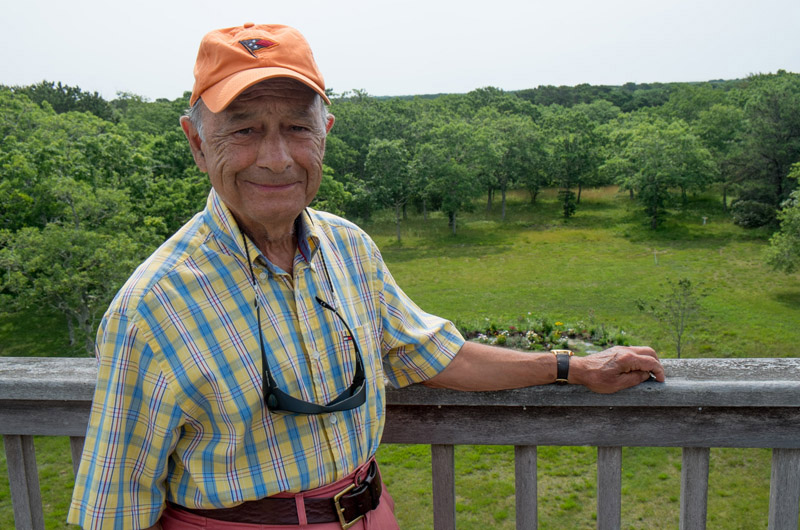Dr. Siamak A. Adibi died peacefully on Sunday, May 10 at his home in Pittsburgh, Pa. He was 88 and had long been a familiar figure on Chappaquiddick where he and his wife Joan have owned a family home since the 1970s.
Born in Iran, he came to the U.S. at a young age and began a career in medicine and basic science that spanned more than four decades. He taught at the University of Pittsburgh from 1966 to 2002, earned a patent for his discovery of a protein-rich solution to replace sugar water for intravenous patients, authored many scientific papers and two books. He believed passionately in the need for world peace, and devoted one of his books to it.
“I have worked so hard,” he told the Gazette in an interview last year. “I spent so much time writing my thoughts about peace.”
He was born on March 17, 1932, to parents Sadgeh Adibi and Nezhat Kazemi. His father was a published author. The surname “Adibi” was given to Siamak’s grandfather by Naser al-Din Shah Qajar and literally translates “poet-general.”
He left Iran at age 17 to come to the U.S. and study science at Johns Hopkins University. He graduated in three years and enrolled at Jefferson Medical College, where he won the prize for surgery. As a recent high school graduate, he organized a group of young Iranian students to charter a plane to study abroad in the U.S. At the last minute prior to their departure, there was a currency crisis. The young men staged a sit-in at the parliament, and at the 11th hour the Shah Mohammad Reza Pahlavi came to the rescue and converted the currency so that their KLM plane could take off.
Years later in 1978, the same Shah offered Dr. Adibi a job as the Imperial Chief of Medicine. The Iranian revolution interrupted those plans, but Dr. Adibi did travel back to Iran after the revolution to deliver lectures to doctors and medical students.
He met Joan Foedisch at a party in Philadelphia in 1960. As the story goes, the other young men at the party were all roughhousing in the backyard while Siamak was rhapsodizing about opera and poetry. The courtship led to a 56-year marriage.
He finished his medical training at Harvard and MIT in the 1960s. Shortly thereafter he and Joan built a summer home on Chappaquiddick, where they continued to live part-time for more than 50 years. Throughout their marriage they remained devoted to music, including the Pittsburgh Symphony, the Pittsburgh Opera and Chatham Baroque, later arranging for the ensemble to give a concert on Chappaquiddick in the summer of 2018.
Siamak could always be soothed by music. In Pittsburgh he had WQED on wherever he went, in his car, and even live-streaming on Chappy. Like the opera he loved so much, he lived passionately and from the heart. He was a champion of causes and fought for what he believed in.
Equally passionate about exercise and nutrition, he was an avid tennis player and competed in the annual Chappaquiddick tennis tournament. But he was most familiar to Chappaquiddickers on his bike, and could be seen pedaling to the ferry, over to town and back nearly every day.
In an interview with the Gazette last summer, Dr. Adibi said he had grown content with his life as a grandfather.
“I am just making myself happy,” he said. “I’ve decided to have fun, because life is so short. I have done my best that I could achieve for the country.”
In addition to his wife Joan, he is survived by three children, Elise, Camron and Jennifer; three grandchildren, three nieces and a nephew.
A celebration of life will be held on May 30 at the First Unitarian Church of Pittsburgh. Friends and family can participate in the live streaming of the service through the church’s website.
Contributions can be made to The First Unitarian Church of Pittsburgh or the Sheriff’s Meadow Foundation.


Comments (18)
Comments
Comment policy »